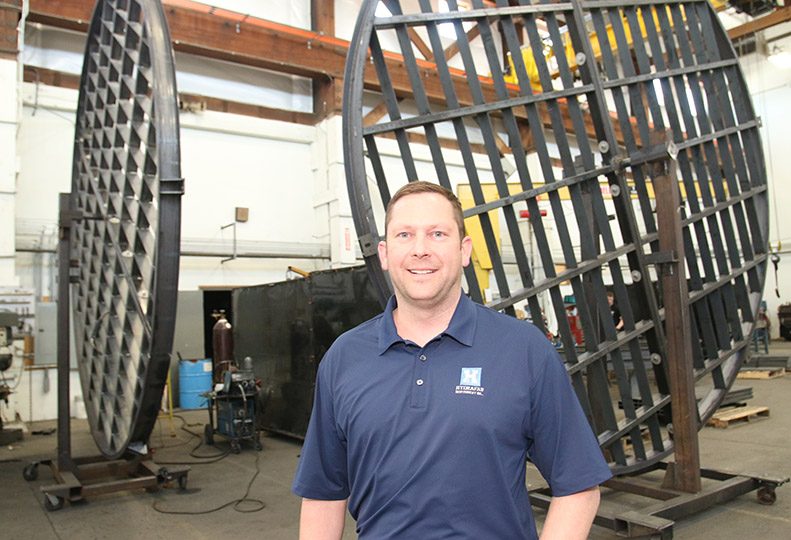Hydrafab is on steady growth track
Spokane Valley metal fabricator eyes five-year goal to double revenue

Hydrafab Northwest Inc., a Spokane Valley metal fabrication company, has been on a consistent growth path since owner and President Chris Henjum started the company 20 years ago.
The company designs, fabricates, and installs equipment and parts used in the food-manufacturing, nutritional supplement, beverage, biotech, and pulp-and-paper industries.
Hydrafab’s products range from a small mounting bracket to 31,000-gallon tanks.
Henjum credits the diversity of its customer base with helping the company navigate the Great Recession without slowing down.
“We didn’t participate in the downturn,” Henjum says of the recession.
The company has 35 employees and its workforce is on an upward trend, Henjum says.
“We set goals on being a certain size revenuewise or employeewise,” he says. “We expected to be able to get to 30 to 50 employees. It’s happened faster than we thought it might.”
Though he declines to disclose total sales, Henjum says Hydrafab is a year and a half into a five-year plan to double its annual revenue.
“We’re on track,” he says. “That’s a milestone we’ve set out to accomplish.”
Hydrafab has been located in the Spokane Business & Industrial Park, at 3808 N. Sullivan Road, since 2010, when the company originally leased 16,000 square feet of manufacturing space there.
“We were in a 12,000-square-foot facility on Trent Avenue prior to that,” Henjum says.
The company expanded to occupy a total of 45,000 square feet of space in 2013 and more recently added 10,000 square feet in another building at the park, where it has moved its engineering department.
“We’ve broadened from being a job shop to doing completely engineered products, including conveyers and fully automated processing equipment,” he says.
Engineered products make up about 30 percent of Hydrafab’s sales, a share that Henjum says he expects will continue to grow.
“Engineering starts with a customer concept,” Henjum says. “The customer meets with us and says, ‘We need a solution for this.’ Then we hit the drawing board.”
Henjum, who has a background in industrial sheet-metal fabrication, founded Hydrafab in 1995 with just a drill press, some welding equipment, and a sheet-metal bending machine called a box-and-pan brake.
The company name refers to its original specialty, which was fabricating metal hydraulic tubing, although the company’s capabilities have grown far beyond tubes and pipes, Henjum says.
Hydrafab had three part-time employees when it started out, including Henjum.
“When we started, we did a lot of work for the agricultural and logging industries,” he says.
Hydrafab went full time in 2002, when a big commercial food-making operation needed additional metal fabrication work for its equipment, he says.
Henjum says that company remains a valued customer, and Hydrafab currently is assisting it with the design and fabrication of conveyers and sanitary piping and tubing.
Today, Hydrafab’s advanced equipment includes an automated, seven-axis tube bender that can form piping and tubing up to 1 ½ inches in diameter into custom shapes.
One of the products it shapes, for example, is an 8-foot-long fuel line with 13 bends, which the machine can form in 20 seconds.
The company also boasts laser cutting equipment for shaping sheet metal and round and square pipes and tubing to meet tight tolerances.
Hydrafab also has state-of-the-art welding capabilities, Henjum says.
Hydrafab’s sheet-metal shop specializes in prototype and short-run production.
“We don’t really do high-volume work,” he says. “We do just-in-time fabrication. We have a pile of parts and build products as needed.”
Most of Hydrafab’s customers are based in the Inland Northwest, although Hydrafab recently installed one of its big tanks onsite at a Midwest company.
“One of our customers-competitors passed our name along,” Henjum says. “We get a lot of referrals. Our customers are our best sales force.”
Though he declines to identify many of Hydrafab’s other customers, Henjum says the company has a strong relationship with Spokane Industries Inc., another Spokane castings and fabricated part manufacturer.
He says Hydrafab has done a lot of work with Spokane Industries as it, too, has grown serving the food and beverage industries.
“We support other manufacturers and machine shops,” Henjum says.
Many of Hydrafab’s customers perform work or conduct sales worldwide. “We don’t necessarily distribute ourselves worldwide, but we work with a network of customers that do,” he says.
For example, Hydrafab makes heavy-duty frames for a strength and fitness equipment manufacturer that sells commercial-grade and competition equipment around the globe.
In a one-of-a-kind project, Hydrafab constructed a steel float for a recent terminal improvement project at the Keller Ferry terminal on the Columbia River.
The wedge-shaped, 16-by-30-foot float helps keep the ramp afloat during low-water flows, enabling vehicles to board and disembark from the ferry.
The float was part of a $3.5 million terminal-improvement project led by Spokane-based heavy-construction contractor Max J. Kuney Co.
Related Articles
Related Products





